

Peer Review Process for Students in Canvas. How to give constructive and useful Peer-to-Peer Feedback - The OpenClassrooms Blog. One of the ways that our students grow and excel throughout their studies, during many of our OpenClassrooms programs, is through peer-to-peer assessment.
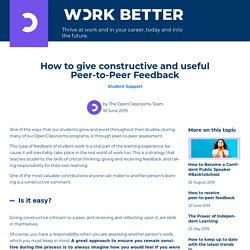
This type of feedback of student work is a vital part of the learning experience because it will inevitably take place in the real world of work too. This is a strategy that teaches students the skills of critical thinking, giving and receiving feedback, and taking responsibility for their own learning. One of the most valuable contributions anyone can make to another person’s learning is a constructive comment. Is it easy? Giving constructive criticism to a peer, and receiving and reflecting upon it, are skills in themselves. Of course, you have a responsibility when you are assessing another person’s work, which you must keep in mind. Also, remember that the process of doing a peer-to-peer review really benefits everyone. Know the difference between “good” and “bad” feedback How to give useful feedback Be direct – say what you mean.
2 SATC AssessTools PeerAssessment 042913. Teaching Students to Evaluate Each Other. Why Use Peer Review?
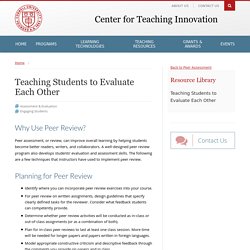
Peer assessment, or review, can improve overall learning by helping students become better readers, writers, and collaborators. The Sheridan Center for Teaching and Learning. Peer assessment - sometimes also called peer grading, peer evaluation, or peer review - is widely used in teaching both online and in person.
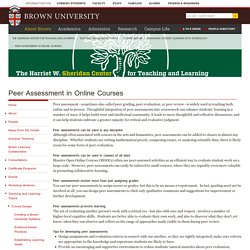
Thoughtful integration of peer assessments into coursework can enhance students' learning in a number of ways: it helps build trust and intellectual community; it leads to more thoughtful and reflective discussions; and it can help students cultivate a greater capacity for critical and evaluative judgment. Peer assessments can be used in any discipline Although often associated with courses in the arts and humanities, peer assessments can be added to classes in almost any discipline. Whether students are writing mathematical proofs, composing essays, or analyzing scientific data, there is likely room for some form of peer evaluation.
Peer assessments can be used in classes of all sizes Massive Open Online Courses (MOOCs) often use peer-assessed activities as an efficient way to evaluate student work on a large scale. Guidelines for Students - Peer Review. "As a peer reviewer, your job is not to provide answers.
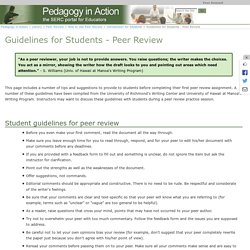
You raise questions; the writer makes the choices. You act as a mirror, showing the writer how the draft looks to you and pointing out areas which need attention. " - S. Williams (Univ. of Hawaii at Manoa's Writing Program) This page includes a number of tips and suggestions to provide to students before completing their first peer review assignment. A number of these guidelines have been compiled from the University of Richmond's Writing Center and University of Hawaii at Manoa's Writing Program.
Peer Review: Commenting Strategies. Conducting Peer Review - Montclair State University. Peer review writing workshops can provide a valuable learning experience for students.
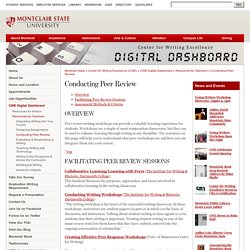
Workshops are a staple of most composition classrooms, but they can be used to enhance learning through writing in any discipline. The resources on this page will help you to understand what peer workshops are and how you can integrate them into your course. ^top Collaborative Learning/Learning with Peers (The Institute for Writing & Rhetoric, Dartmouth College) This handout discusses the purposes, approaches, and issues involved in collaborative learning in the writing classroom. Conducting Writing Workshops (The Institute for Writing & Rhetoric, Dartmouth College) "The writing workshop is the heart of the successful writing classroom. Creating Effective Peer Response Workshops (Univ. of Minnesota Center for Writing) "In courses where the primary instructional focus is not on writing, instructors may question whether the benefits of peer collaboration are worth the time and planning it requires.
Peer Assessment and Peer Evaluation. Canvas: How do I use peer review assignments in a course? PeerEval GroupWork formsample1. Teach Risk-taking – Institute for Emerging Issues. We must teach our youth to look for opportunities and that failure in pursuit of them is a learning opportunity and “badge of honor,” not a stigma to avoid at all costs.
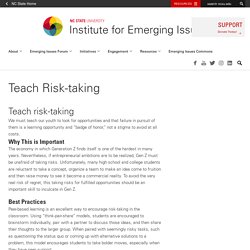
Why This is Important The economy in which Generation Z finds itself is one of the hardest in many years. Nevertheless, if entrepreneurial ambitions are to be realized, Gen Z must be unafraid of taking risks. Unfortunately, many high school and college students are reluctant to take a concept, organize a team to make an idea come to fruition and then raise money to see it become a commercial reality. To avoid the very real risk of regret, this taking risks for fulfilled opportunities should be an important skill to inculcate in Gen Z. Best Practices Peer-based learning is an excellent way to encourage risk-taking in the classroom. Current Context in NC There are opportunities at many of higher education institutions to develop risk-taking skills.